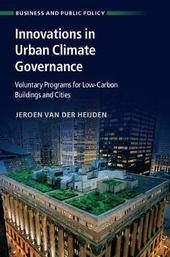
|
Innovations in Urban Climate Governance: Voluntary Programs for Low-Carbon Buildings and Cities
Hardback
Main Details
| Title |
Innovations in Urban Climate Governance: Voluntary Programs for Low-Carbon Buildings and Cities
|
| Authors and Contributors |
By (author) Jeroen van der Heijden
|
| Series | Business and Public Policy |
|---|
| Physical Properties |
| Format:Hardback | | Pages:352 | | Dimensions(mm): Height 235,Width 157 |
|
| Category/Genre | Sustainability |
|---|
| ISBN/Barcode |
9781108415361
|
| Classifications | Dewey:304.2091732 |
|---|
| Audience | | Tertiary Education (US: College) | | Professional & Vocational | |
|---|
| Illustrations |
Worked examples or Exercises
|
|
Publishing Details |
| Publisher |
Cambridge University Press
|
| Imprint |
Cambridge University Press
|
| Publication Date |
20 July 2017 |
| Publication Country |
United Kingdom
|
Description
Building on unique data, this book analyses the efficacy of a prominent climate change mitigation strategy: voluntary programs for sustainable buildings and cities. It evaluates the performance of thirty-five voluntary programs from the global north and south, including certification programs, knowledge networks, and novel forms of financing. The author examines them through the lens of club theory, urban transformation theory, and diffusion of innovations theory. Using qualitative comparative analysis (QCA) the book points out the opportunities and constraints of voluntary programs for decarbonising the built environment, and argues for a transformation of their use in climate change mitigation. The book will appeal to readers interested in sustainable city planning, climate change mitigation, and voluntarism as an alternative governance mechanism for achieving socially and environmentally desirable outcomes. The wide diversity of cases from the global north and south generate new insights, and offers practical guidelines for designing effective programs.
Author Biography
Jeroen van der Heijden is an associate professor of urban climate governance at the Australian National University. He aims to improve local, national and international outcomes of urban governance on some of the most pressing challenges of our time: climate change and urbanisation.
Reviews'In Voluntary programs for sustainable buildings and cities, Jeroen van der Heijden looks critically at the performance of voluntary programs for sustainable development in urban renewal. The analysis, covering 35 programs from six different countries, is conceptually, empirically and methodologically astute. The book should be required reading for students of environmental policy, governance theory, and political economy.' Jon Pierre, Goeteborgs Universitet and University of Melbourne 'This book offers a rich and highly systematic empirical account of various voluntary programs for sustainable buildings and cities, viewed through a number of different theoretical lenses. It extends well beyond well known cases in Northern Europe to draw fascinating comparisons with new governance practices in Asia, the US and Australia. And it advances rapidly emerging debates on climate governance innovation beyond the UNFCCC. Highly recommended.' Andrew Jordan, Tyndall Centre, University of East Anglia 'Jeroen van der Heijden's book is an innovative and impressive great-leap forward in extending the theory of regulation to areas and issues that were not studied from this point of view before. The scope and depth of the analysis makes it a must read for scholars and practitioners alike.' David Levi-Faur, Hebrew University of Jerusalem 'The built environment is a key focus for climate action in cities. Examining a wide range of voluntary programmes for reducing carbon emissions in buildings in Europe, Asia, North America and Australia, this book examines whether promises for action have been achieved in practice. It finds that while the opportunities for action appear plentiful, such schemes may be deluding themselves about the difference that they are making on the ground and the leadership they provide in the sector. A narrow focus on a small segment of the market and the limited ambition of many of the programmes involved has restricted their impact. The overly positive discourse surrounding such schemes, van der Heijden argues, is based on a 'leadership delusion' that such schemes can provide a beacon for others to follow. ... Richly detailed, empirically rigorous and innovative in its design and approach, this book provides an original account of how voluntary forms of climate governance are working in cities in different contexts, providing insight for students and researchers alike and with valuable lessons for the policy process.' Harriet Bulkeley, University of Durham
|